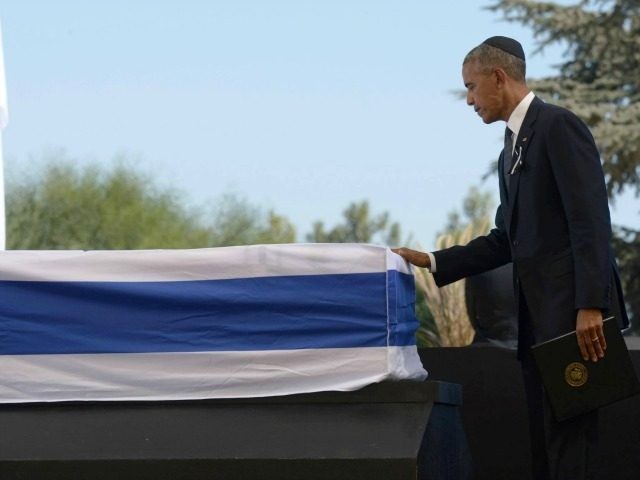Washington D.C. — The State Department on Wednesday used the memory of late Israeli President Shimon Peres to condemn an Israeli government decision to build new Jewish homes in the strategic West Bank.
The construction plans include a new neighborhood of 98 homes for the already existing settlement of Shiloh, a city with biblical significance in Judaism and the Torah. The neighborhood is part of a larger contingent of 300 new homes to be attached to the Shiloh settlement.
Mark C. Toner, Deputy Department Spokesperson, slammed the Jewish construction approval in a harshly worded statement that invoked Peres, a staunch supporter of the so-called two-state solution and the creation of a Palestinian state.
The statement reads:
“We strongly condemn the Israeli government’s recent decision to advance a plan that would create a significant new settlement deep in the West Bank.
“Proceeding with this new settlement, which could include up to 300 units, would further damage the prospects for a two state solution. The retroactive authorization of nearby illegal outposts, or redrawing of local settlement boundaries, does not change the fact that this approval contradicts previous public statements by the Government of Israel that it had no intention of creating new settlements. And this settlement’s location deep in the West Bank, far closer to Jordan than Israel, would link a string of outposts that effectively divide the West Bank and make the possibility of a viable Palestinian state more remote.
“It is deeply troubling, in the wake of Israel and the U.S. concluding an unprecedented agreement on military assistance designed to further strengthen Israel’s security, that Israel would take a decision so contrary to its long term security interest in a peaceful resolution of its conflict with the Palestinians. Furthermore, it is disheartening that while Israel and the world mourned the passing of President Shimon Peres, and leaders from the U.S. and other nations prepared to honor one of the great champions of peace, plans were advanced that would seriously undermine the prospects for the two state solution that he so passionately supported.”
Here, the State Department may be wrongly using Peres’s name and legacy. Peres was an architect of the Oslo Accords, a land-for-peace process aimed at giving the Palestinians autonomy and eventually a state. But Peres did not argue for the complete dismantlement of the entire settlement enterprise or the evacuation of every Jewish community from the West Bank. Indeed, he was an early supporter of the settlement process.
Peres’s Oslo Accords called for a process to achieve a treaty based on United Nations Security Council Resolution 242, the only binding resolution pertaining to the West Bank. That document calls on Israel to withdraw under a future final-status solution “from territories occupied” as a result of the 1967 Six Day War. The resolution does not call for a withdrawal from “all territories,” a designation deliberately left out to ensure Israel’s allowance under a future deal to retain some territory for security purposes.
The Jewish Virtual Library explains:
The Security Council did not say Israel must withdraw from “all the” territories occupied after the Six-Day war. This was quite deliberate. The Soviet delegate wanted the inclusion of those words and said that their exclusion meant “that part of these territories can remain in Israeli hands.” The Arab states pushed for the word “all” to be included, but this was rejected. They nevertheless asserted that they would read the resolution as if it included the word “all.” The British Ambassador who drafted the approved resolution, Lord Caradon, declared after the vote: “It is only the resolution that will bind us, and we regard its wording as clear.”
The Palestinian Authority and much of the international community says Israel is occupying the so-called pre-1967 borders, meaning the Gaza Strip, West Bank, and eastern Jerusalem, including the Temple Mount. Israel refers to the pre-1967 territories as disputed.
The Obama administration routinely complains about Jewish construction in the West Bank and eastern Jerusalem but it has been silent on rampant illegal Palestinian construction on Jewish-owned property in eastern sections of Jerusalem. This includes the construction of dozens of apartment buildings on about 270 acres in the Jerusalem neighborhoods of Qalandiya and Kfar Akev and about 50 acres in a north Jerusalem suburb known as Shoafat. The land is undisputedly owned by a U.S.-based Jewish group.
Shiloh, meanwhile, is the ancient Samarian city mentioned in the Torah as the resting place of the Tabernacle. The Book of Joshua also relates: “The whole congregation of Israel assembled together at Shiloh and set up the tent (or tabernacle) of the congregation there.”
Aaron Klein is Breitbart’s Jerusalem bureau chief and senior investigative reporter. He is a New York Times bestselling author and hosts the popular weekend talk radio program, “Aaron Klein Investigative Radio.” Follow him on Twitter @AaronKleinShow. Follow him on Facebook.

COMMENTS
Please let us know if you're having issues with commenting.